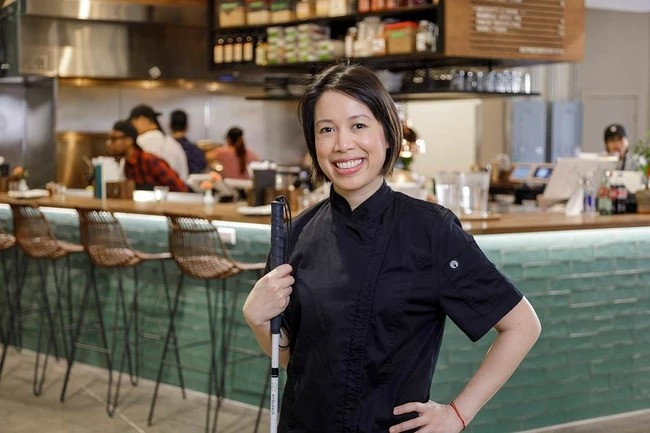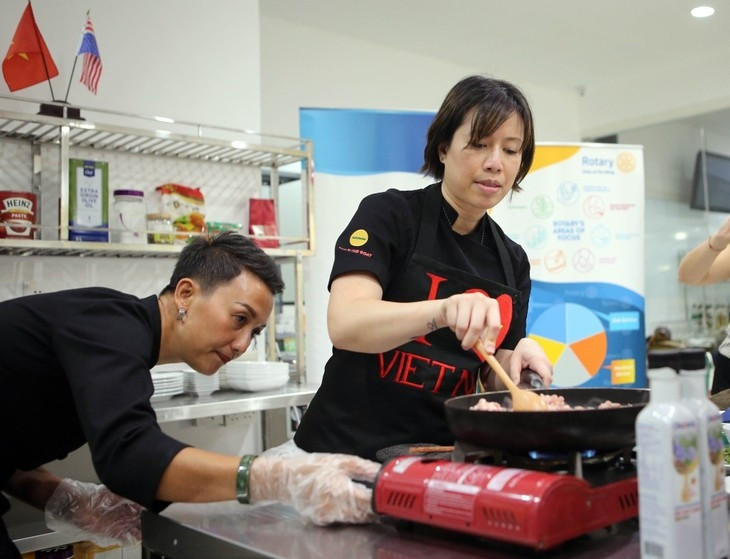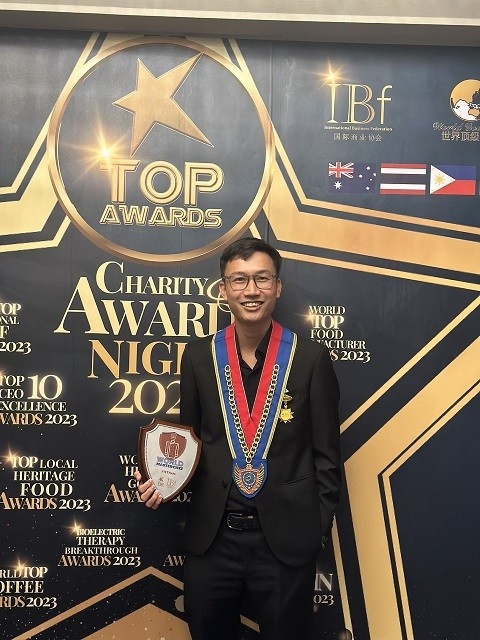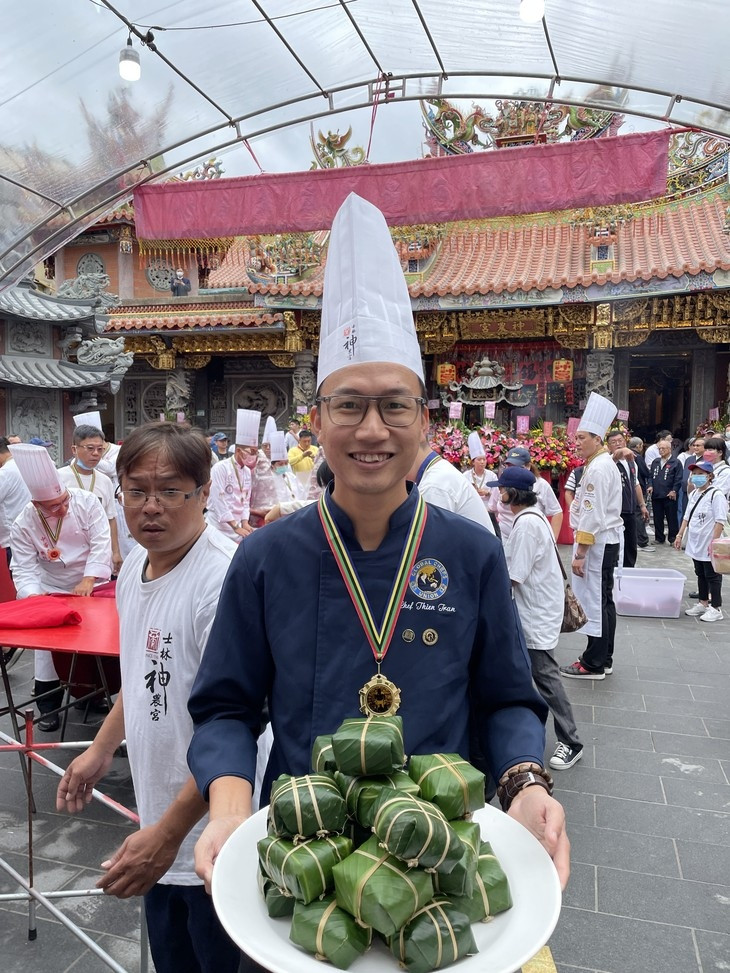

Vietnamese-American chef Christine Ha stunned the world by becoming the winner of US MasterChef’s third season in 2012, when she was 33. She was the first Vietnamese-American – and the first visually impaired person – to win this competitive cooking show produced and judged by chef Gordon Ramsay.
Beating out more than 3,000 amateur chefs from across the US, Ha won over the judges with Ca kho (caramelized braised catfish) – a classic Vietnamese dish infused with childhood memories of when Ha’s mother used to cook it for her family.
Winning the MasterChef competition earned Ha a US$250,000 cash prize and a contract to publish the cookbook she was writing. Christine Ha now serves as a culinary envoy to other countries where she promotes her favorite Vietnamese dishes.
Ha noted, “Vietnamese food has a special place in my heart because I grew up eating it. I love its flavors. It’s my favorite cuisine. I want to show other people who are not Vietnamese how great Vietnamese food can be and how creative it can be.”
Christine Ha was born in California. Her parents were Vietnamese who emigrated to the US in 1975. The family eventually settled in Houston, Texas, when Christine was two years old.
Christine Ha grew up with the flavorful Vietnamese dishes her mother and grandmother cooked for her. Ha’s mother passed away from an illness when Ha was very young.
When Ha turned 18, she was diagnosed with severe neuromyelitis optica spectrum disorder (NMOSD) and completely lost her eyesight at the age of 20. Undeterred by this challenge, Ha graduated with a bachelor's degree in business administration and finance from the University of Texas at Austin.
She later earned a master of fine arts degree in creative fiction and nonfiction from the University of Houston and worked as an editor for several American literary magazines.
Throughout life’s challenges, Ha has maintained her ambition for writing and has also developed a passion for cooking.
“So for me, even though I started losing my vision due to an autoimmune disease, I still wanted to learn to cook for myself. I had to keep re-teaching myself how to do the same things with less and less sight, because my parents always taught me that it’s important to be independent and learn to rely on myself and live that way,” Ha said.
Ha taught herself to cook with some basics from a cookbook and the Vietnamese recipes she inherited from her mother. Without sight, she cooks from her imagination and uses all her other senses to experience each dish. Ha says Vietnamese fish sauce is a secret recipe for creating a unique flavor.
“Fish sauce can be very universal and be used in a lot of things. For example, if I make Texas-style chili with beef and dried peppers of the region, I add a little bit of fish sauce for that saltiness and umami, but just a little bit so that when people eat it, they sense something really interesting, savory and good and umami, but they don’t know what it is."
"Or when I make Italian Bolognese sauce, I also use fish sauce, because I think fish sauce can be very universal. Italians have their own version of fish sauce, but if you use it in a way that is not too much, it doesn’t overwhelm or overpower the dish. I think that’s the secret of fish sauce.”
When competing in the US Master Chef cooking contest, Ha decided to cook Vietnamese dishes like thit kho (braised pork) and ca kho (caramelized braised fish) to show the world how humble everyday Vietnamese dishes can win people’s hearts.
She said, “It’s not like I’m going to cook something that’s amazing and very high-end, elevated food. For me, it’s about telling my story and why I cook the food. It’s about cooking very humble dishes like Ca kho and Thit kho trung, because those are dishes I grew up eating and I love. And those are dishes that my co-contestants probably don’t know how to cook. And they don’t know how to use fish sauce. So I took that as my advantage."
"I think that was my strategy for cooking Vietnamese food on MasterChef. It was the cultural value. As a Vietnamese you have to have Vietnamese values in your dishes,” she stressed.
After the MasterChef contest, Ha continued to pursue her writing ambition. She wrote a cookbook called "Recipes From My Home Kitchen: Asian and American Comfort Food", which became a New York Times bestseller. Then she tried television, co-hosting a cooking show in Canada called “Four senses”.
She also judged MasterChef in America and was among the judges on MasterChef Vietnam Season 3. Ha has done a lot of pop-ups, both in Houston and abroad.
Last September Ha came to Vietnam to serve as a Culinary Ambassador of the US Embassy in Vietnam. In Vietnam she has participated in several cooking exchanges and joined activities to inspire disadvantaged young people.
“I’m very excited to be here in the homeland of my parents. I was born and raised in America but I’m a Vietnamese by heritage, and by culture. And I decided to embrace that culture. I’m here to show what it’s like to be a Vietnamese-American, to cook foods of different cultures, and what American food is like, and also how you can put a Vietnamese spin on a lot of food because food is universal, so you find things that are familiar, then you recreate it and give it a twist.”

During her last trip to Vietnam, Christine Ha performed cooking demos to teach children with disabilities how to make a salad and Vietnamese sticky rice. She also travelled to Son La province, where she created several dishes using local ingredients.
Since her victory on MasterChef, Christine has opened three restaurants in the United States, two of which feature Vietnamese cuisine. Her first restaurant, The Blind Goat, in Houston, Texas, serves Vietnamese street food with a Texan twist. Her second restaurant, Xin Chao, is dedicated to Vietnamese cuisine tailored to American tastes. She opened it with chef Tony Nguyen in September 2020.
She and her husband John Suh opened a Korean restaurant in Texas called The Sighted Pig Test Kitchen, a reference to her husband’s Vietnamese zodiac sign. The menu is based on authentic Vietnamese dishes, specifically drawing inspiration from “Nhau” dishes which are served during drinking beer or alcohol.
As a culinary envoy for the American Embassy, Ha works tirelessly to popularize the special flavors and stories of Vietnamese food. For her cuisine is more than just a way to satisfy your palate. It also promotes cultures and understanding between peoples of different countries.
“I think food is universal, because everyone has to eat and everyone understands the importance of food in culture and in each person’s life. When you share your cuisine, other people learn where you are from, what kind of food you eat, and who you are as a person. With Vietnamese food there’s so much diversity in the flavors. If you go from the North to the Central region to the South, you’ll find different flavors, different dishes more traditional for that area."
"There’s so much variety. When you share food with other countries, other cultures, and other people, it’s a form of diplomacy because diplomacy, in the end, is about making relationships stronger. I think food has an important role in that,” Ha shared.
Chef Tran Le Thanh Thien is a talented and devoted master of Vietnamese and international cuisine. A Vice President of the World Association of Master Chefs and a culinary lecturer and innovator, Thien has been a major contributor to making Vietnamese cuisine more widely known.

“When you visit any country, cuisine plays a significant role denoting who you are and where you come from. Thus, I nurtured the idea to bring Vietnamese dishes to the world.”
Thien carved his name in the culinary world with a number of awards, including the “International Judge – World Master Chef (Vietnam) award”, a special award from the International Business Federation (IBF) and International Business Federation –Travel (IBF Travel) in the International Judge category.
At his young age, Thien is Vice President of the World Association of Master Chefs in Vietnam, Vice President of the Global Chefs Union and a lecturer of CY Cergy Paris Université at Ho Chi Minh City University of Technology (HUTECH). Thien is also known as an innovator, promoting Vietnamese cuisine to other countries.
Thien was a former student at the Ho Chi Minh University of Technology (HUTECH University) majoring in Business Administration, but he had developed a great passion for cooking from his mother. During his university time, he took several cooking courses. Thien said at first he had no intention of pursuing a career in the culinary field.
After graduating, Thien, by chance, met Ms. Nguyen Thi Dieu Thao, a popular name in the culinary industry, and Chef Thomas J. Biesewig - German Master Baker, who helped him develop his ideas. Thien then decided to become a lecturer with a major in the Restaurant–Hotel industry.
Thien not only invests a lot of his time in cooking. He cooks each dish with meticulous sophistication. In the early days of his career, Thien realized that Vietnamese cuisine has a lot of potential but was not widely known to the world.
Thien said, “Vietnam has lots of talented chefs, but they are not aware of or don’t know how to promote their dishes to other countries. Several years ago, I started teaming up with some chefs to work on ways to bring the quintessence of Vietnam to the world. We started first with some neighboring countries such as Singapore, Thailand, Indonesia, and the Philippines. I led groups of Vietnamese chefs by joining competitions and exchanges with chefs from other countries.”

Thien said Vietnamese cuisine is diverse according to different areas, using different spices such as “mac khen”, which is quite close to pepper with mild spicy taste and intense aroma, commonly known as Indian prickly ash or Szechuan pepper, “la mac mat” (clausena indica), or fish sauce made from different kinds of fish.
“Vietnam is heaven for various kinds of spices, which make its dishes distinctive from others. Last August, I was the Vietnamese representative to attend an Asian culinary conference where I talked about the spices of the northwestern region of Vietnam, including pepper and “mac khen”.
"As a food researcher, I want to delve further into and spread Vietnamese food, dishes, and typical spices and ingredients of Vietnam. Participating in international conferences attended by researchers and experts, I hope Vietnamese cuisine becomes better known to the world,” said Thien.
At a number of cooking demos, Thien showcased Vietnamese dishes with typical flavors of mac khen, pepper, and fish sauce. To foster cross-culture communication, he focuses on food fusion in which he combines ingredients from different cultures and merging recipes to elevate Vietnamese dishes in a creative way.
“Such a classic Vietnamese dish like Ốc nấu chuối đậu (cooked snail with banana and soy curd) can be made into a fine-dining dish in a creative way. The traditional Vietnamese Oc nau chuoi dau is in the form of a sauce, which includes fully cooked green bananas, tofu, fatty pork belly, and slightly chewy snails. In this new way, I am still using the basic ingredients but create a twist by using two different kinds of snails made into snail pies."
"The sauce still has the flavor and color of ground turmeric but it is in a liquid form with a lighter taste. When people enjoy Oc nau chuoi dau, they still feel the familiar taste of the classic dish but with a new kick of crunchy snail pies and a lighter sauce," he said.
"Another example is the seafood wonton with American blueberries. You know, the traditional shrimp and pork wonton combined with the new ingredient of blueberries will create a surprisingly delicious dish.”
As a culinary lecturer, researcher, Vice President of the World Association of Master Chefs in Vietnam, and Vice President of Global Chefs Union, he has organized and judged many cooking competitions for students in the restaurant and hotel industry.
He has also attended and organized a number of international cooking competitions and culinary exchanges with international chefs where he has a chance to honor and introduce Vietnamese dishes to foreign gourmets. Thien said there are a number of factors to consider while going to a foreign country for cuisine and cultural exchanges.
“When choosing to introduce a Vietnamese dish to a country, it is essential to do some research about its culture, cuisine, and people’s preferences to choose suitable dishes and ingredients. For example, Muslim countries do not have pork, we can’t offer them such dishes like Vietnamese “com suon” (pork ribs with rice) or Com Tam (Vietnamese broken rice with grilled pork). In some countries where people don’t eat beef, we can’t introduce Vietnamese beef noodles there," Thien shared.
"With Vietnamese “banh mi with pate”, pork paste is not suitable to be introduced in a Muslim country. Another factor to consider is the combination of different ingredients. When you want to create a dish using the ingredients of the native country, it is essential to do a lot of research to decide which ingredients can be combined or mixed together to create the best flavors that can make people say “Wow!” when trying it,” he added.
Tran Le Thanh Thien is not only an excellent chef but also a person who has actively contributed to the development of the Vietnamese culinary industry. Thien says he hopes to inspire and train a generation of young talent to further develop the Vietnamese culinary industry.
He said, “To become a respectable chef, first, cook with all your heart. Moreover, to promote and introduce Vietnamese food to the world, we need to carefully do research about different cultures, different ingredients, and how to make full use of Vietnam’s indigenous ingredients to elevate Vietnamese dishes."
"We honor our spices and indigenous ingredients not only for cuisine promotion but also for tourism development as other countries are doing. A chef must also have a profound knowledge of cuisine as well as culture. As Vietnam is integrating strongly in the world, knowing foreign languages is a prerequisite condition,” he noted.
As a lecturer, a culinary researcher, and a member of many culinary organizations, Thien is still exerting his utmost effort to inspire the next generation of chefs as well as to join other chefs like Christine Ha to make Vietnamese cuisine shine in the world.
Source: VOV